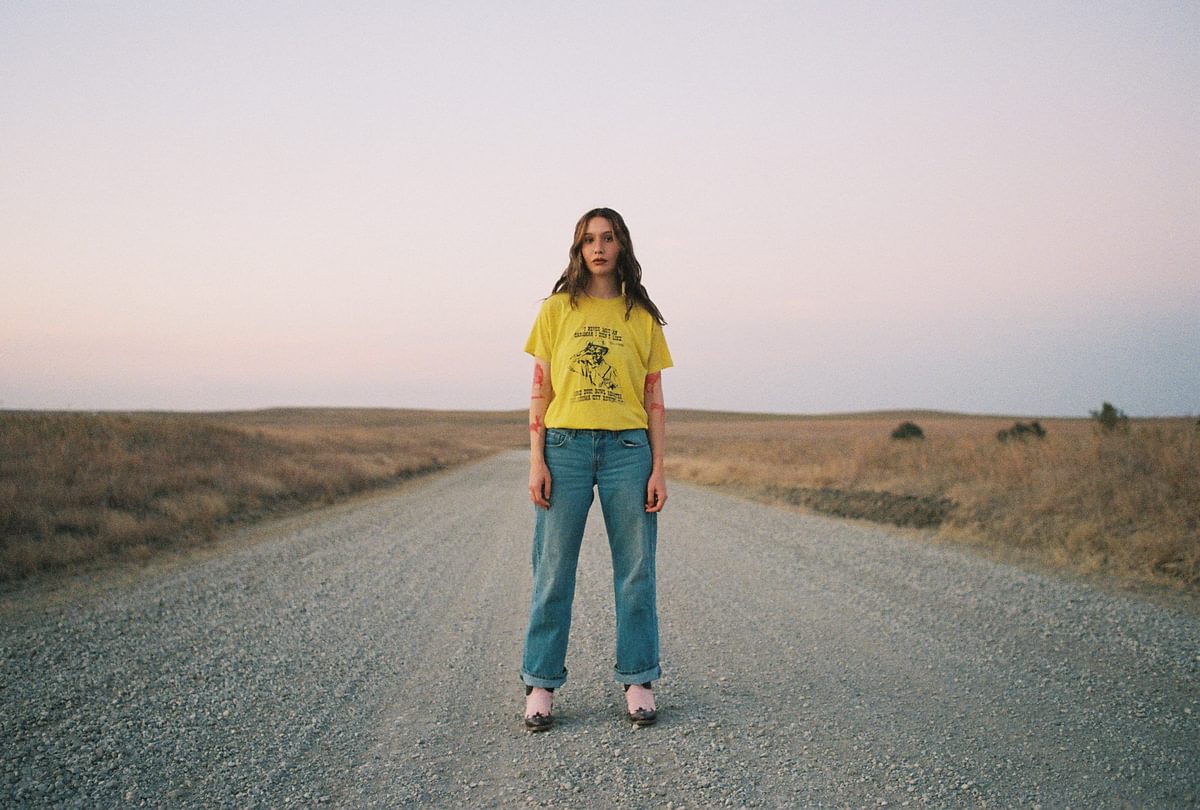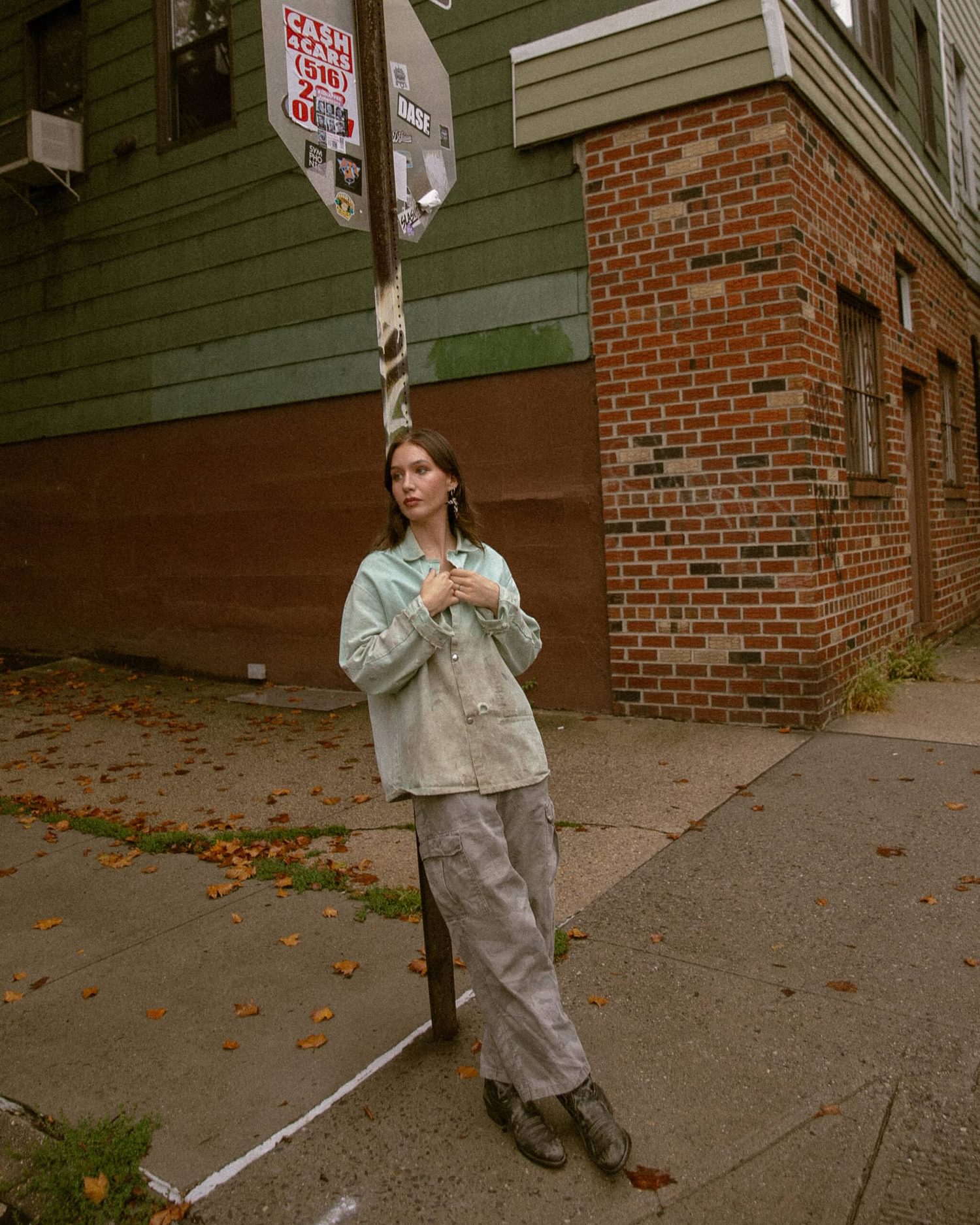
Ken Pomeroy is howling at the moon
Following the tradition of her Cherokee heritage, Ken Pomeroy relies on storytelling – to understand herself, her family, and how in the heck she got her heroes to play on her new album. She tells Max Mazonowicz all about the road to Cruel Joke.
Some artists chase trends, but Ken Pomeroy is chasing ghosts – the half-remembered hymns of John Denver, the Oklahoma songwriters who took her in, the Cherokee stories that won’t let her go.
The musical roots of the 22-year-old Cherokee folk singer run deep: growing up, Pomeroy was exposed to “Sixties and Seventies music and yacht rock, Eighties hair metal, and all that kind of thing,” she tells me, all of which shaped her unique approach to music – though they are not the sounds you’ll hear on her new record, Cruel Joke. At least not directly.
Among all of this sonic discovery, one formative experience stands out: “I heard John Denver for the first time when I was six or seven years old, and I just immediately became obsessed,” Pomeroy says. Denver’s songwriting captured the fledgling musician, its emotional impact sparking a desire to create something with similar depth.
Clutching her new mission, Pomeroy dived into the supportive community inhabiting the Oklahoma music scene, connecting with artists such as John Moreland, John Calvin Abney, and Carter Sampson. These established legends welcomed Pomeroy, offering her opportunities to perform: “They would lend me their stage if they were playing. They would let me play a few songs,” she explains. This camaraderie was essential in blossoming her growth as a musician.
“I think it’s a pretty even mix of both,” Pomeroy tells me, reflecting on whether her writing is more influenced by her upbringing or the Oklahoma music community. Either way, lyrical content is a priority for Pomeroy, and she cites Moreland as a key influence: “I did listen to music a lot for the lyrics, and that was always really, really important to me, and I just loved John Moreland, so much,” she explains. “He was one of my favourite artists when I was in my teens and it’s incredible that I’ve gotten to work with him and now we’re friends. It’s just kind of a crazy thing.”
In recent years, she’s also focused on production and sound, especially while creating her new record. Working with partner Dakota McDaniel proved crucial: “We were on such the same page. When we first started working on the record, it was so helpful, because I had been working with a few different people and they were steering me in a direction that I knew wasn’t the right one for me or the songs.” That joint understanding of her vision was essential to the album’s creative process and ultimately how it turned out. She summarises it succinctly: “It’s really easy to give someone the keys to the truck when you trust them.”
Pomeroy doesn’t find it easy to describe her approach to songwriting, but when it comes to translating songs from page to sound, she’s clear on how that works: “The core of the song is very much the same, and I think that’s where Dakota and I are on the same page. It’s not necessarily about changing the song, but enhancing the song.” Pomeroy explains that enhancement comes through instrumentation and production – emphasising how that shared artistic vision brings out the best in her work. “I think that it’s really important to focus on what the song needs,” she says, “and if you’re in a room full of people that get where you’re trying to go with something, it’s a good process.”

Every songwriter has their favourite child, and pushed to choose, Pomeroy highlights “Dogs Die” as one that is personally significant but perhaps overlooked. The song explores themes of family and identity, inspired by the discovery of long-lost relatives – so long-lost, in fact, that she never knew they existed. When she was 14, she found out she had a sister. “And then just a few years ago, I found out that my grandma had another daughter and my dad had a sister. My dad found out that he had a sister when he was 51 years old! So you really never know – family can just be the craziest thing,” she baulks.
Songwriting in general is a necessary outlet for Pomeroy, the natural way to work through all of life’s surprises and stories. “I think that even if I didn’t have a career doing this, I would have to do it. I mean, I’ve tried to quit music so many times, just because it’s a lot for me,” she explains. “I’m just pretty upfront about a lot of things, and sometimes that gives people an invitation that I didn’t necessarily mean to be an invitation in.” Despite the challenges of the music industry, Pomeroy values the ability to connect with listeners through honest expression. “A lot of people go through the same things. I struggled when I was growing up and into my adult years, just finding songs that were sad enough to relate to, and I want to be that for somebody. Anything to make someone not feel alone is all right with me.”
Pomeroy’s Cherokee heritage also influences her work, with her songs referencing or inspired by nature. Storytelling is central to Cherokee tradition, a value that resonates with Pomeroy’s chosen path: “It’s a culture that I grew up in. With any native tribe, storytelling is the most important part of how to carry on tradition and how to carry on language. I don’t think it’s a coincidence that I’m a storyteller for a living.”
The song “Coyote” offers a personal example: “[Coyote] was a nickname given to me because I was a little shit. I was sly, so it’s kind of like a term of endearment from my mama, but it’s not the greatest omen,” she admits. “In my adult years I started to become something that I wasn’t okay with, and I needed to fix some things about myself otherwise I wouldn’t be able to have people I truly love around, because I was kind of this negative and broken person. I wrote that song, kind of realising that I was a coyote, and that was okay, but I needed to fix it. I had to grow up very quickly.”
“My childhood was a little tumultuous, and that contributes to how people act when they’re adults, but at some point you can’t blame your childhood for everything that you could potentially be working on, and I think that moment hit me, and I was like, ‘All right, it’s okay that I’m the coyote, and it’s okay that I’m realising this because this is the first step to maybe fixing the things that I’m not okay with.’”
And part of that growing up has been dealing with the demands of the music industry. “You’re not only a musician; you’re building a business, essentially,” Pomeroy observes. Some things are harder to come to terms with: “It’s sometimes hard for me to promote things because I’m like, ‘well, that’s kind of gross.’” But the work that needs to be done to build her own brand and understand the business is becoming clearer: “If you want to be a musician and you want to be successful at it there are a lot of things that come with it that maybe you didn’t sign up for, and I’m learning a lot about how those things work.”
Touring and live performance bring their own challenges and rewards, even though she started playing live almost ten years ago, when she was 13: “I started playing this place called JJ’s Alley Pub in downtown Oklahoma City, and they had a songwriter night every Sunday.” Pomeroy finds that performing can be nerve-wracking, while also providing a powerful connection with the audience and a means of further processing the emotions within the songs. “I am very nervous every single time I perform. I have really bad stage anxiety,” Pomeroy shares.
Bringing things full circle, she had John Moreland play on “Coyote”. “I had seen John Moreland around, and we had some mutual people that we knew, but not until recently did we really interact and kind of become friends,” she explains. The two Oklahomans formally got together for the song when Pomeroy DM’d Moreland: “I said, ‘I know this is random but can I send you a song that I might want you to sing on.’ And he was, like, ‘yeah, sure.’ So I texted him the song, he listened to it, and here we are!”
Get the Best Fit take on the week in music direct to your inbox every Friday

Lorde
Virgin

OSKA
Refined Believer

Tropical F*ck Storm
Fairyland Codex





